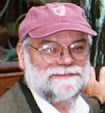Irish Blessing
Go n-éirí an bóthar leat
Go raibh an ghaoth go brách ag do chúl
Go lonraí an ghrian go te ar d'aghaidh
Go dtite an bháisteach go mín ar do pháirceanna
Agus go mbuailimid le chéile arís,
Go gcoinní Dia i mbos A láimhe thú.
Approximate Phonetic Transcription:
/guh NARE-ee un BOE-her LAHT/
/guh RAH un GHEE guh BRAH egg duh KHOOL/
/guh LAHN-ree un GHREE-un guh TAY er DIE-eee/
/guh DITCH-uh un WAH-shtakh guh MEEN er duh FARK-ahn-nuh/
/AH-gus guh MU-uh-lih-midge luh KHAY-luh uh-REESH/
/guh GHINN-ee DEE-uh ih MUSS ah LAW-vuh HOO/
[The capitalized syllables above receive more stress. What I transcribe with "kh" is written "ch" in Irish, and represents the sound at the end of the word "loch" (lake) or the "ch" in German words like nicht or Nacht. Some Irish sounds can only be phonetically represented by a system like the International Phonetic Alphabet, which I don't have access to. Irish has many dialects, and I think my pronunciation is a mishmash of dialects. Imagine speaking an American dialect with elements of John F. Kennedy, Jimmy Carter, and Dennis Kucinich--that's what my Irish pronunciation is probably like.]
I'll try to find a way to post an audio or video version of the blessing (haven't figured out how to do that yet).
Traditional Translation:
May the road rise to meet you
May the wind be always at your back
May the sun shine warm upon your face,
The rains fall soft upon your fields
And until we meet again
May God hold you in the hollow of His hand.
[A more idiomatic translation of line 1 is something like “May you be successful.” But I love the strangeness and poetry of “May the road rise to meet you.” Literally the verb “éirigh” means “to rise,” but in this context it means “to be successful.”]
Subscribe to:
Post Comments (Atom)


No comments:
Post a Comment